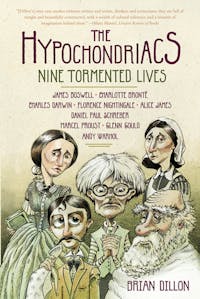The Hypochondriacs
Nine Tormented Lives
 Download image
Download image
ISBN10: 0865479461
ISBN13: 9780865479463
Trade Paperback
288 Pages
$18.00
Charlotte Brontë found in her illnesses, real and imagined, an escape from familial and social duties, and the perfect conditions for writing. The German jurist Daniel Paul Schreber believed his body was being colonized and transformed at the hands of God and doctors alike. Andy Warhol was terrified by disease and by the idea of disease. Glenn Gould claimed a friendly pat on his shoulder had destroyed his ability to play piano. And we all know someone who has trawled the Internet in solitude, seeking to pinpoint the source of his or her fantastical symptoms.
The Hypochondriacs explores, in the stories of nine individuals, the relationship between mind and body as it is mediated by the experience, or simply the terror, of being ill. And, in an intimate investigation of those lives, it shows how the mind can make a prison of the body by distorting our sense of ourselves as physical beings. Through witty examinations of the lives of these eminent hypochondriacs—James Boswell, Charlotte Brontë, Charles Darwin, Florence Nightingale, Alice James, Daniel Paul Schreber, Marcel Proust, Glenn Gould, and Andy Warhol—Brian Dillon unravels the tortuous connections between real and imagined illness, irrational fear and rational concern, the mind's aches and the body's ideas.
Reviews
Praise for The Hypochondriacs
"An intriguing, suavely written blend of medical history and literary criticism, a book that adds to the growing (or metastasizing) field of pathological biography."—Heller McAlpin, Los Angeles Times
"Dillon writes the sort of refined, slightly rarefied prose that might have once been called belletristic—an old-fashioned word for an old-fashioned but pleasant style. This balances out the freakish complaints and treatments undertaken by his subjects, and so The Hypochondriacs walks the line between voyeurism and thoughtfulness with considerable dexterity . . . What makes The Hypochondriacs fascinating is the ever-shifting spectacle it offers of human folly and ingenuity, and the revelation that it can be so hard to tell the two apart."—Laura Miller, Salon
"Dillon's brimming volume . . . provides good company for the ceaselessly suffering imaginary-malady-struck."—David Finkle, The Huffington Post
"Superb . . . Thought-provoking and gracefully written."—Daphne Merkin, Bookforum
"[Dillon's] nine case studies embrace writers and artists, thinkers and iconoclasts; they are full of insight and beautifully constructed, with a wealth of cultural reference and a breadth of imagination behind them."—Hilary Mantel, London Review of Books
"[The Hypochondriacs] is not a book you can't put down. It is a book you will keep putting down, both to absorb what [Dillon] has said and to postpone reaching the end. There is no higher compliment." —Michael Bywater, The Independent
"There is an abundance of ‘wracked truth' in this book. It will delight, inform, move and horrify any of the millions of us."—Sam Leith, The Daily Mail
"[An] excellent book."—Kevin Jackson, The Sunday Times (London)
"The story of hypochondria through the lens of a few of its famous sufferers. Though the concept has evolved over the centuries, its victims have continued to suffer horribly and to make enormous demands on others. The hypochondrium, the area of the abdomen housing the liver, gall bladder and other organs, was initially conceived as the seat of human melancholy and, in that quaint term, the vapors. As Cabinet magazine U.K. editor Dillon (In the Dark Room: A Journey in Memory, 2005) demonstrates, it is not difficult to see how the term has transformed to mean what it has today. He playfully defines hypochondriacs as 'other people,' then offers a more generic definition: persons who suspect that diseases-or mental illness-have moved in permanently. He examines the cases of nine cultural celebrities from more than two centuries, including Boswell, Darwin, Proust and Warhol. In each of the essays he covers much of the same ground, including the person's family history, symptoms, treatments (from physicians and others), death and, finally, the significance. The author includes excerpts from letters, diaries and other biographies and books by physicians, psychologists and quacks from all relevant periods. He also identifies a problem inherent in his analysis: Because medical knowledge and terminology have changed dramatically, it's very difficult to tell exactly what, if anything, was ailing Charlotte Bronte, Darwin, Alice James and others. Nonetheless, he dives into their stories and turns up some intriguing facts and trends . . . The cumulative effect of these stories is a surpassing sadness—poor Glenn Gould and others, retreating from a world in which they could not adequately function. Sturdy research and subtle analysis of these extreme cases produce some startling insights into human suffering."—Kirkus Reviews
"There are some famous people who are well known for living tormented or eccentric lives: the self-destructively fastidious Glenn Gould, or Andy Warhol, with his obsessive fear of disease. But who, except perhaps for avid fans or scholars, knew that Charles Darwin suffered from a variety of self-inflicted ailments (as well as excessive flatulence)? Dillon uses the lives of these and other notables (such as Florence Nightingale and James Boswell) to explore the many meanings and manifestations of hypochondria. Most interesting, perhaps, is the way the author shows how hypochondria can both limit a person's way of life while also enriching that person's life. Boswell, for example, obsessively scheduled his own life, but without his fear of formlessness, he might night never have become a writer. This deeply fascinating study will turn the reader's eyes inward, to focus on his or her own foibles and compulsions and to wonder what they might really mean."—David Pitt, Booklist
Reviews from Goodreads
BOOK EXCERPTS
Read an Excerpt
1. James Boswell's English Malady
‘He is a convalescent whom the last relapse will infallibly destroy.'
Jean-Jacques Rousseau, Correspondence générale de J.-J. Rousseau
On Saturday, the 6th of August 1763, James Boswell,...



